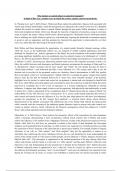“The instinct to control others is natural in humanity”
In light of this view, consider ways in which the writers explore control and authority
In ‘Paradise Lost’ and ‘A Doll’s House’, Milton and Ibsen explore the authoritative figures, both associated with
marital and inimical relationships, which the protagonists are subjected to the control of, however it is debatable
whether this instinct to control others is natural. Indeed, through his epic poem, Milton introduces a variety of
literal and metaphorical battles which arise through the rejection of oppressive hierarchies, using its enormous
scope to analyse the nature of these conflicts from a human perspective. Meanwhile, Ibsen’s realist play enables
him to challenge the idyllic lifestyles typical in a well-made play, exposing the dictatorial environment required
to preserve such an appearance and thus granting his characters the opportunity to claim authority over their
own lives, rather than their fate being in the hands of others.
Both Milton and Ibsen demonstrate the perpetuation of a natural gender hierarchy through marriage, within
which the wives, as the traditionally inferior sex, are expected to exhibit complete dependency upon their
husbands. In ‘Paradise Lost’, Adam’s supremacy as “the Head” acts as the foundation of his marital relationship,
provoking significant instability and even punishment once his authority begins to be challenged; in ‘A Doll’s
House’, the oblivion generated by Helmer’s censorship of Nora’s knowledge and experiences is so great that she
is labelled “a child”, preserving her subservient position until receives the education necessary to defy it. In
Eden, the conflict between male dominance and female autonomy encompasses the marriage of Adam and Eve,
as illustrated by Adam’s insistence that he must “guard” and “shade” his wife despite her plea for them to
“divide [their] labours”; such behaviour provides a clear reflection of a 17th century male’s duty to use his
absolute rule to provide for the presumed weaker sex, therefore Adam’s determination to fulfil this justifies
Beer’s perception of him as a “careful patriarch”. Indeed, while Eve’s yearning for agency outside of the marital
bond is clear, the fact that her husband believes he is “more wise, more watchful, stronger” in her presence
highlights how his instinct to control and censor her environment is natural and even designed to benefit both
their lives; while Milton advocated against such censorship for men, this restriction would most likely have been
perceived as acceptable due to Eve’s lack of experience as a woman rendering her vulnerable to external
influences. It appears that Adam simply wishes to use his superiority, both physically and intellectually, in order
to protect Eve, which is epitomised by his consideration that he “should conceal and not expose to blame” her
responsibility for the Fall. However, such “uxoriousness” (C.S. Lewis) could instead undermine this notion of
male control and instead elevate the influence of Eve; the fact that Adam places his wife above God ultimately
prompts his punishment as he did “resigne [his] manhood”, a criticism which clearly echoes Milton’s
denouncement of the idolatry associated with Catholicism due to his Puritan faith. Indeed, the repercussions
which coincide with this reversing of the traditional gender hierarchy begin to present only male control over
women as natural, which is clearly reflected by the financial consequences which Nora endures in ‘A Doll’s
House’ after acting separately from her husband’s influence.
Meanwhile, in ‘A Doll’s House’, Ibsen explores the derogatory effects of the expectations for male dominance
within a marriage, demonstrating a more revolutionary outlook which counters that of Milton and clearly
reflects the influence of his mother-in-law, Magdalene Thoreson, a leader of the feminist movement in Norway.
Indeed, while both Eve and Nora are pressured to submit to the control of their husbands, the Norweigan
emphasis on the patriarchal ideal in marriage, in which women were expected to be virtually powerless, prompts
the repression of Nora’s character to the extent that she is perceived as infantile. For example, Helmer’s frequent
references to his wife as “little squirrel” and “little songbird” deny her the opportunity to mature as an
individual, thus reinforcing the power imbalance between the two and hindering her from understanding the
reality of the outside world; it is this naivety which prompts Scott to label her a “restless, illogical, fractious and
babyish little wife”. This perception is emphasised in the Garland production of the play, during which Nora
whines and motions with her hands as if she truly is a “little squirrel” and thus gains Helmer’s affection; such
behaviour is not only dehumanising but also presents her to literally be her husband’s “pet”. Indeed, the extent
of Helmer’s physical control is epitomised in Act 3, where he “leads her, despite her efforts to resist him” into
the bedroom and ultimately proclaims “aren’t I your husband?”; such sense of entitlement was expected of men
during the Victorian fin de siècle, as women were forbidden to express their own desires and made to solely




